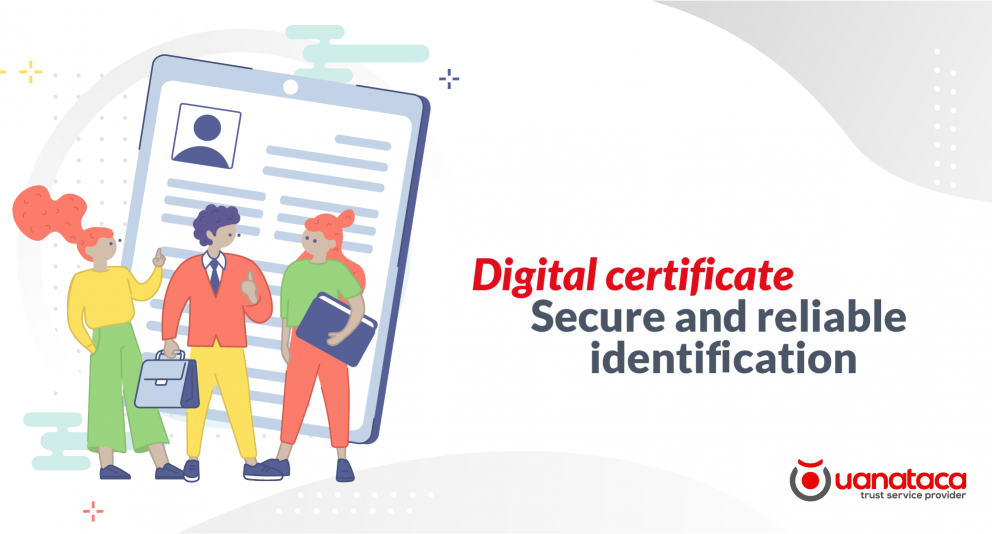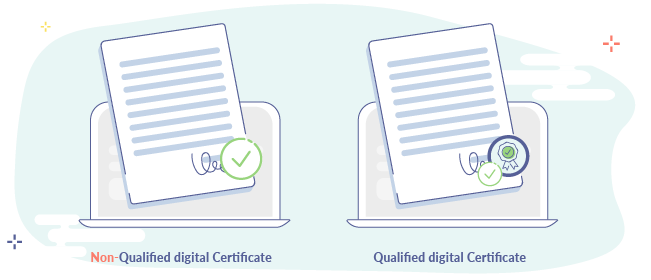
In recent years, many of us have needed to use a digital identification method at some point. The restrictions resulting from the pandemic and the increase in the number of digital platforms have favored that, with greater frequency, we resort to online means of identification to perform everyday tasks such as interacting with the Public Administration. However, the rate of fraud and theft is often proportional to the use of identity.
In the face of possible risks and threats, digital certificates are one of the safest tools. Discover the advantages of identifying yourself with digital certificates and how you can issue and manage your employees' digital certificates independently.
Why it is so important to have a secure and reliable method of digital identification
Almost 8 out of 10 (77%) Internet users have used some method of digital identification at some point, according to data from the ONTSI Study on digitization in the Administration. At the professional level, the use of identification methods has increased significantly. In spite of this, greater use of our identity does not mean that we are using those means of identification that guarantee and are secure enough to prevent our data from being exposed to fraudulent use.

Currently, the importance of cybercrime is growing year by year. Among the different types of crime, cybercrime focuses on data theft. Currently, all over the world, State Authorities and Forces are actively fighting against this type of crime, reinforcing the capacities of investigation and prosecution of cybercrime, in order to guarantee citizen security and the protection of rights and freedoms in cyberspace.
For their part, companies should avoid using vulnerable means of identification. Digital certificates, especially qualified ones, are one of the best digital identification tools that guarantee secure use. Therefore, more and more companies are issuing digital certificates to their employees, providing them with their own digital identity.
Qualified digital certificate: advantages and guarantees as a means of digital identification
In companies, it is quite common for their employees to use a digital identification method to carry out daily telematic procedures. To ensure proper use and maximum protection, simple-to-use tools are needed that simplify procedures and generate a high degree of trust.
In this sense, digital certificates provide professionals with their own identity and are a reliable method of digital identification. However, not all have the same capabilities: their security and reliability depend on the type of certificate, the guarantees offered by the issuer and its centralization and custody.
1.- Types of digital certificates. According to eIDAS ( Regulation (EU) No 910/2014 on electronic identification and trust services), there are two types of certificates: qualified digital certificate and unqualified digital certificate.
The main difference between the two is the issuer: qualified certificates are issued by a Qualified Trust Service Provider, while unqualified certificates are issued by a certification authority not accredited as a QTSP.

The "Qualification" of a digital certificate provides greater guarantees, such as those related to the information contained in the certificate. This guarantees the veracity of the data, its origin and ensures the verification process of the content.
2.- Particular guarantees of a Qualified Trust Service Provider, A trusted service provider is one that provides one or more trusted services, such as electronic signatures, time-stamping and digital certificates.
Through their infrastructure and human team, they will develop services characterized by their legality and security. Concerning safety and security, they must use systems that are reliable, tamper-proof and tamper-resistant. Also, they are obliged by law to take measures against counterfeiting and data theft.
>> Related post: What is a Qualified Trust Service Provider?
Once centralized, in case of loss of a certificate or the need to remove an employee's access permission, it is possible to revoke the digital certificate autonomously. In this way, it is possible to protect the digital identity of companies and their employees and to avoid bad practices.
In the case of qualified digital certificates, the custody of the pair of keys that compose it -one public and one private- is key to data protection. In the case of certificate centralization, the key pair is unique and is generated in an HSM server: a secure cryptographic device supervised by a Certification Service Provider.
3.- Centralization of the digital certificate. In the companies, it is more and more necessary to carry out an agile management and an exhaustive control of the digital certificates of its workers and of the use that they make of it. To achieve this, the centralization of digital certificates allows to collect all digital certificates in a single point, avoiding risky situations.
Once centralized, in case of loss of a certificate or the need to remove an employee's access permission, it is possible to revoke the digital certificate autonomously. In this way, it is possible to protect the digital identity of companies and their employees and to avoid bad practices.
In the case of qualified digital certificates, the custody of the pair of keys that compose it -one public and one private- is key to data protection. In the case of certificate centralization, the key pair is unique and is generated in an HSM server: a secure cryptographic device supervised by a Qualified Trust Service Provider.

If you want to leave us your comment on this post, you can do so in the form below. ⬇️